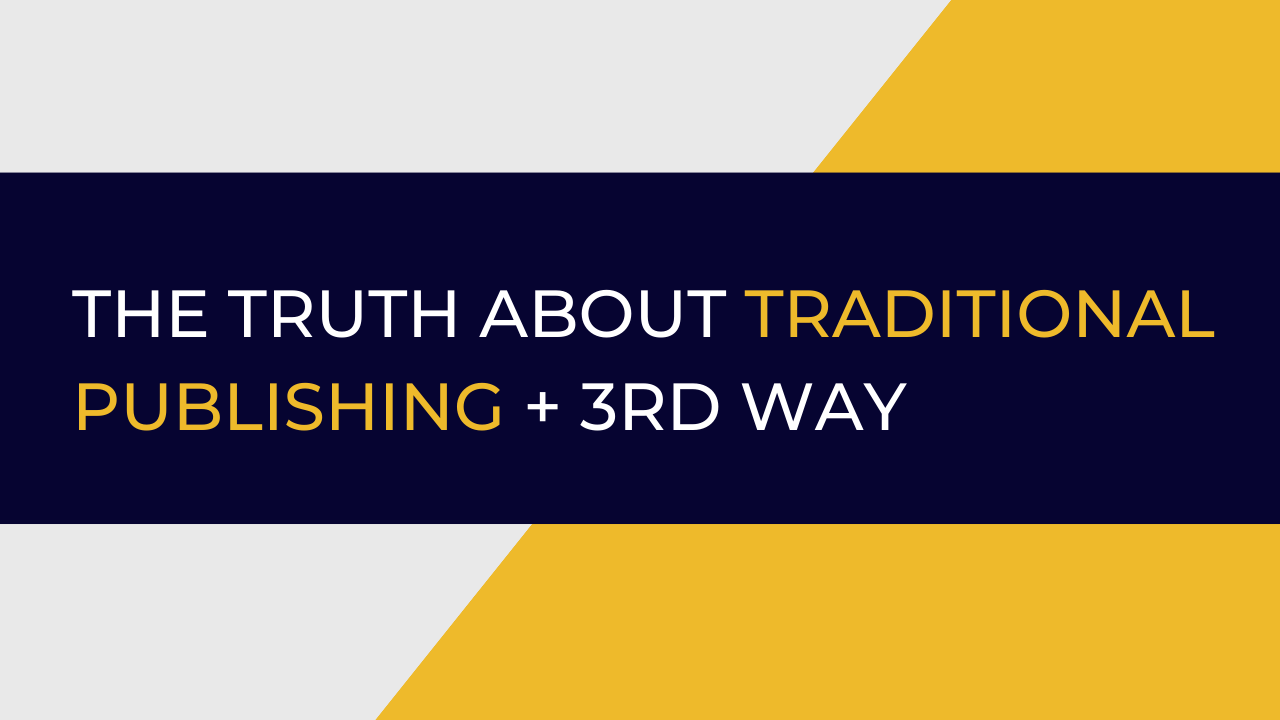The Truth About Traditional Publishing vs. Self-Publishing + 3rd Option
If you're an aspiring author, chances are that you've heard publishing lies or half-truths. Entrepreneurs, businesses, and publishing gurus pushing their agenda sometimes spread incorrect or incomplete information about the industry.
In this article, you'll learn the truth about the publishing industry and learn which publishing path is right for you.
No time to read this article and simply want expert advice? Book a free call here.
See, most aspiring authors know the two main publishing routes: traditional publishing and self-publishing. However, there's a third alternative, hybrid publishing, which we'll also cover in this article. All three approaches have pros and cons, and while having options is great, it can be hard to find reliable information about them. Proponents of each publishing path will often give you a one-sided perspective.
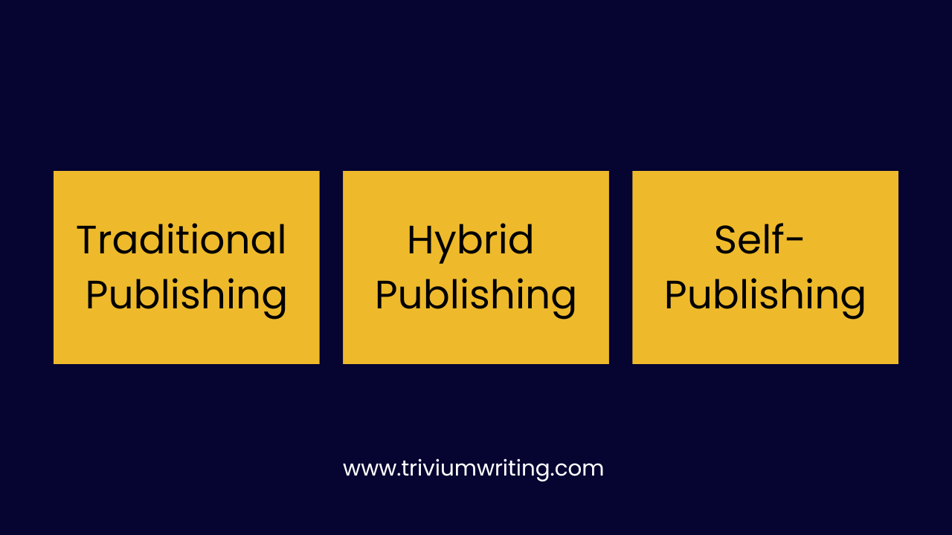
For example, few people working in traditional publishing would make a fair case for self-publishing and hybrid publishing. After all, traditional publishing is their work—and sometimes their life. Likewise, traditionally published authors take pride in having received a book deal, as they should. But that doesn't mean other options aren't viable for other authors.
Here are two examples of cases against self-publishing:
The bias, however, may be more acute on the self-publishing side. Many entrepreneurs have capitalized on the extraordinary growth of the self-publishing industry and services such as Amazon KDP, IngramSpark, and BookBaby.
As a result, companies such as Self-Publishing School and Scribe Media (as well as other self-publishing coaches) tend to present self-publishing as the only viable publishing option. Their position is understandable because that's how marketing works, but once again, that doesn't mean other options aren't viable.
Ultimately, it should be no surprise that people have strong opinions and emotions about the industry and its inner workings. It is a complex industry—with a projected growth of around USD 19.2 billion by 2026.
Table of Contents
- The 3 Lies of Publishing
- Traditional vs Self-Publishing: A Summary
- Important Reminders About Publishing Approaches
Key Takeaways
- Traditional publishing allows you to publish for free, is highly selective, and provides little control; self-publishing costs you money, has no barrier to entry, and provides a lot of control; hybrid publishing costs you money, has few barriers to entry, and provide a moderate amount of control.
- Every author is different, and only by looking at your specific situation can you determine which publishing approach is best for you.
- Entrepreneurs, businesses, and gurus often want to tell you what to think, but they only do so because it benefits their agenda.
- Every publishing approach has benefits and disadvantages, which you should carefully weigh before making a final decision.
- Publishing approaches aren't mutually exclusive, namely, you can try to get a traditional publishing deal and resort to another publishing method if it doesn't work.
- Trivium Writing is here to help you if you need expert guidance on which publishing approach to choose. Book a free call here.
The 3 Lies of Publishing
If you only take away one thing from this article, it should be that the three main publishing types come with their own narrative. At the core of these narratives are lies or half-truths, which benefit their proponents.
Let's cover the lies and half-truths of each publishing type.
Traditional Publishing Lie
A traditional publisher guarantees you sales and will spend a great deal of time, effort, and money marketing your book.
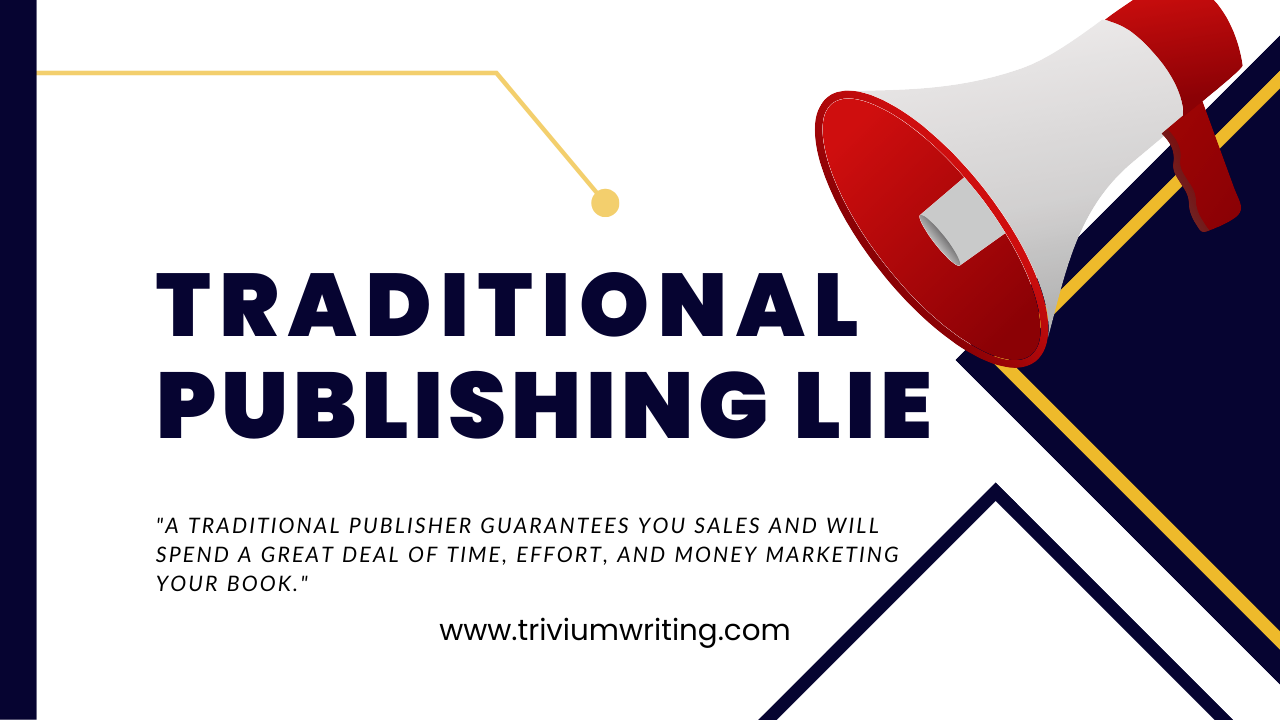
That isn't the case—at least not anymore. While landing a traditional book deal is prestigious, it does not guarantee fame and riches. Unless you already have a large audience, you can't expect to become a bestselling author through a traditional publishing deal—though it is entirely possible that you do.
Although some people claim they have the perfect recipe for a bestselling book, there is no guaranteed bestselling book formula. Timing, topic, and author notoriety play a large role in the making of a bestseller, but traditional publishers can't always accurately predict which book will be the most successful.
The other reality is that traditional publishers have limited marketing budgets. They may publish 20 to 30 titles a year (or more), but that doesn't mean they have the resources to market all these books as much as they deserve. To be strategic, publishers must put their resources toward the books that have the best odds of selling a lot of copies. Publishers are, after all, for-profit businesses.
In the self-publishing world, there is a widespread belief that traditional publishers don’t market anything and that it is all up to the author. While it's true that traditional publishers no longer market aggressively, they still provide a certain baseline of marketing work, as Rachelle Gardner outlines in this article.
For instance, traditional publishers provide:
-
promotional materials
-
trade advertising
-
internet marketing
-
internet advertising
-
specialized promotion
-
trade publicity
-
consumer publicity
That said, as a traditionally published author, you're expected to do most of the book marketing. The publisher's marketing efforts won't be very successful unless you put the time and energy into marketing your book. That's why many argue that publishers don't market books.
Self-Publishing Lie
Self-publishing guarantees you more money than if you published traditionally.
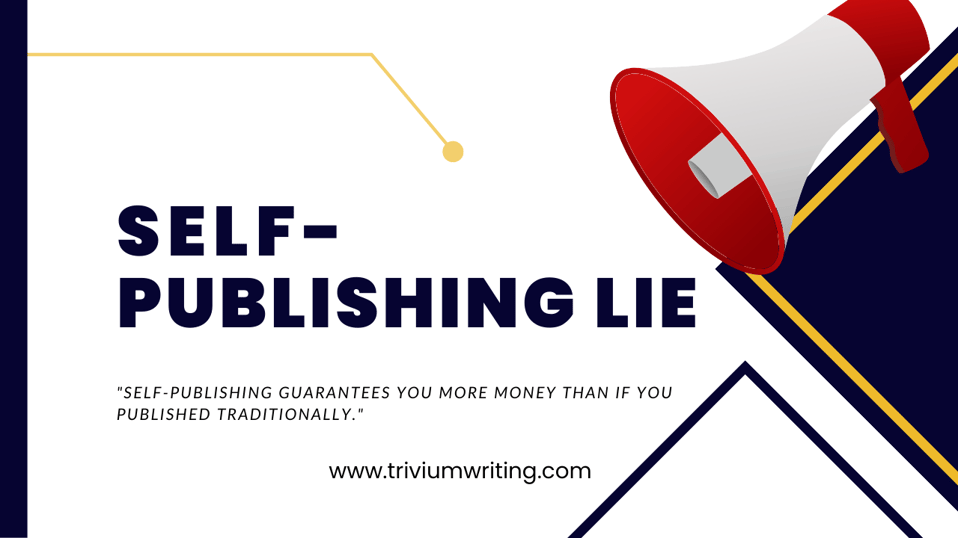
True, you'll keep more of your book's profits by self-publishing. However, this view doesn't consider the difficulty of getting your book out there. To make serious money off your book, you need either a large audience or a sound marketing strategy.
Here are a few ways you can market your book:
-
Promoting your book organically to your social media audiences
-
Doing interviews on podcasts and radio shows related to your book's topic
-
Hosting your own podcast on the topic of your book and inviting guests
-
Attending local, regional, national, and international book fairs to meet readers
-
Using paid advertising, including Google, Amazon, Facebook, and LinkedIn ads
-
Creating strategic alliances with other players in your field to promote your book
Marketing your book does take time and effort. But that doesn't mean you should try to get a traditional publishing deal at all costs. Rather, this means you should adjust your expectations based on your marketing skills or your ability to outsource marketing. This also means you should consider growing an audience before publishing your book.
Ultimately, your book will sell based on these three factors:
-
the demand for your book
-
the size of your audience
-
the quality and consistency of your marketing efforts
In the end, both traditional and self-publishing require marketing on the author's part. The big difference, however, is that authors keep more profits from their books with self-publishing. Once again, don't be confused. A higher profit margin from fewer sales means less money in the end. Only as long as you sell a high number of books will you actually benefit from self-publishing vs. traditional publishing.
The last factor to consider is the credibility you get from a traditional book publishing deal. For better or worse, organizations, institutions, and individuals associate traditional publishers with higher author value. This means that if you seek speaking engagements — an opportunity that will open up regardless of how you publish — you may find more and better-paid engagements if you were working with a traditional publisher.
Hybrid Publishing Lie
All hybrid publishers are vanity publishers and aren't worthy of consideration when publishing.
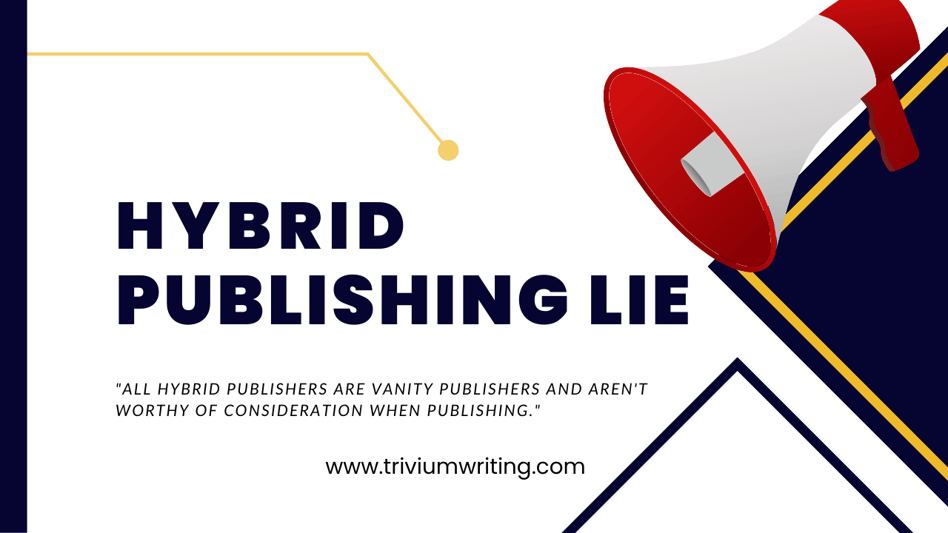
Vanity and hybrid publishers have earned a terrible reputation in the publishing industry. Many of them charge exorbitant prices to authors and do not always live up to a professional standard. While the two are similar, vanity and hybrid publishers are different—and that distinction matters.
Vanity publishing refers to publishers who sell a publishing service under the guise of being legitimate traditional publishers. Hybrid publishing, however, simply refers to publishers who charge for their publishing services.
Vanity and hybrid publishers follow the same business model. They're both hybrid, but vanity publishers position themselves as prestigious as traditional publishers, which they're not. In a traditional publishing agreement, authors don't have to pay a penny. On the contrary, they're the ones getting paid.

While bad hybrid publishers abound in the marketplace, many provide great services and are worthy of consideration. What you should look for in a hybrid publisher is quality, transparency, and integrity. Make sure you check the reviews, read your contract thoroughly, and avoid companies that make frivolous promises.
To help you, the Independent Book Publishers Association created a codified list of criteria for hybrid publishers.
The IBPA criteria include:
-
Defining a mission
-
Vetting submissions
-
Committing to truth and transparency
-
Providing a negotiable contract with authors
-
Publishing under its own imprint(s) and ISBNs
-
Publishing to industry standards
-
Ensuring editorial, design, and production quality
-
Providing distribution services
-
Demonstrating respectable sales
-
Paying authors higher-than-standard royalty
Here are some hybrid publishers you may want to consider:
-
Book Leaf (USA)
-
Friesen Press (Canada)
-
Page Two (Canada)
-
Morgan James (USA)
-
Amplify Publishing (USA)
-
Köehler Books (USA)
-
Lioncrest Publishing (USA)
Traditional vs Self-Publishing: A Summary
In a nutshell, what is the difference between traditional vs self-publishing?
In traditional publishing, you let the publisher's team takes care of everything from editing, marketing, printing, and distribution. You do the writing; they do the publishing. Your publisher will also likely pay you a sum of money (known as an advance) before publication. However, your publisher has a say over your book content, title, and cover art.

Traditional publishing is a great option if you want to focus on writing and aren't interested in learning the business side of publishing. Traditionally published authors receive a lower royalty rate, but they save a lot of work and stress by working with publishing houses. That said, it can be difficult to get a book deal from a traditional publisher in the first place. When you do, you likely won't have much control over the creative process or the final product.
Self-publishing, on the other hand, gives you complete control over your book. In addition to writing, you must also take care of publishing. You become responsible for everything from editing and design to marketing, sales, and print distribution. In other words, you become your own publisher. This can be a lot of work, and you'll definitely want to outsource these tasks to professionals, but it also means you'll keep more of your book's profits and have more control over the final product.
Self-publishing is a great option if you want higher royalty rates and don't mind doing more than writing. Today, thanks to a technology called "print on demand," it's easier than ever to self-publish your book. Many authors self-publish their books, and a number of them find great success—sometimes more than if they worked with a publisher. It does take time and effort to get your book out in the world, but the book sales may well be worth it.
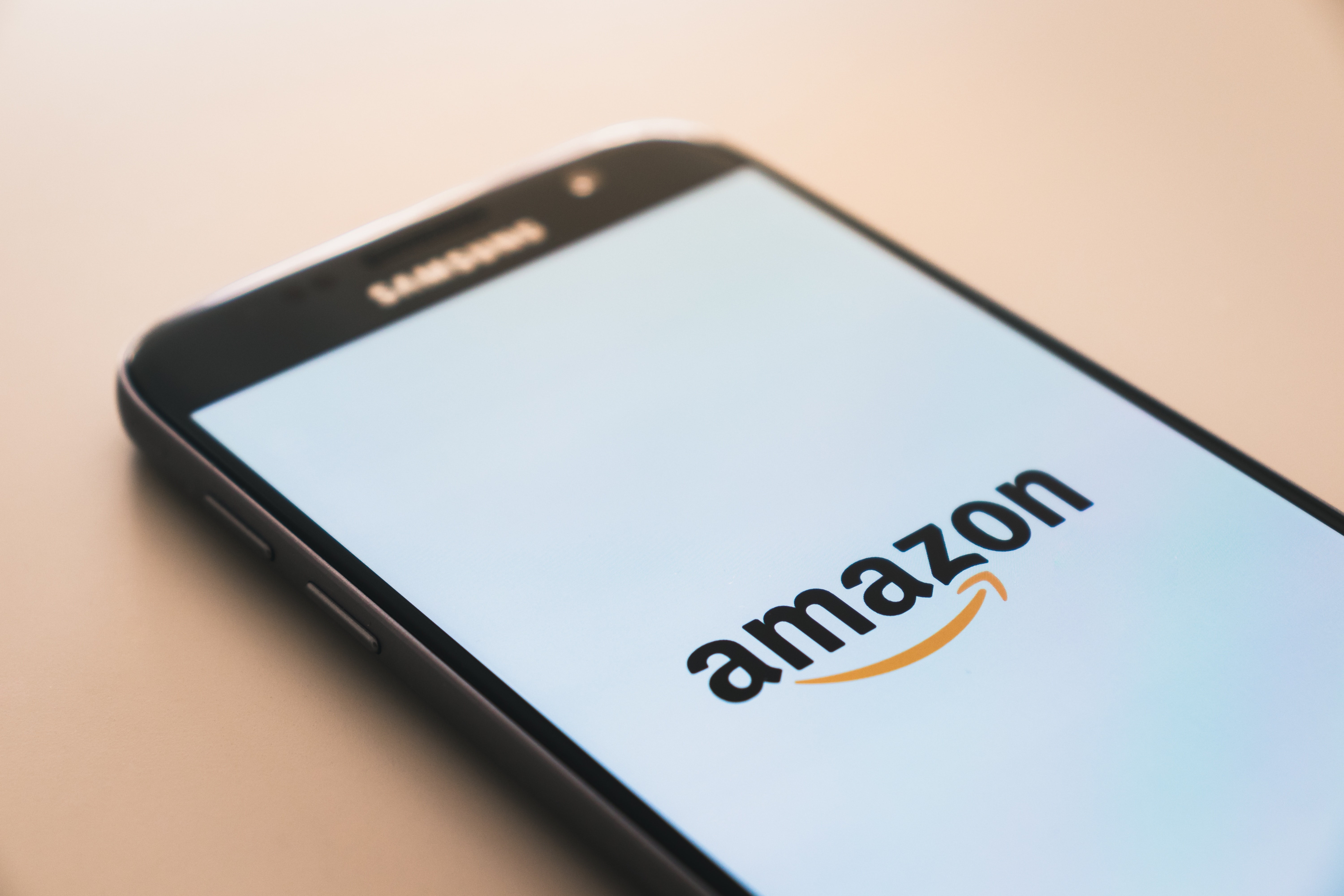
Finally, let's not forget our third option—hybrid publishing. Authors choose to work with hybrid publishers because they want to self-publish without the hassle. A hybrid publisher is a publishing company you pay to publish your book and from whom you can expect traditional publishing quality. With a hybrid publisher, you typically don't sell your rights away, and you also don't need an agent to represent you. Indie authors sometimes prefer hybrid publishers because it spares them the extra work of publishing.
Hybrid publishing is a great option if you have the money to spend on your book (it can range between $10,000 and $100,000). Authors who work with hybrid publishers typically see their books in bookstores and tend to be happy with the quality of their print books. That said, hybrid publishers aren't for all indie authors. Some authors report that the investment they make with hybrid publishers is too high relative to how much they make back.
Pros of Traditional Publishing
The nature of a traditional book deal is that the publisher covers all costs for publishing your book. Many argue this type of publishing is obsolete, but it is still the type of publishing that produces the most bestsellers.
Even if you're not a well-known figure, there are good reasons to sign a book deal with a traditional publishing house. Many traditionally published authors are happy with the arrangement they have with their publishing house and make a decent amount of money from their books.
Here are three pros of traditional publishing:
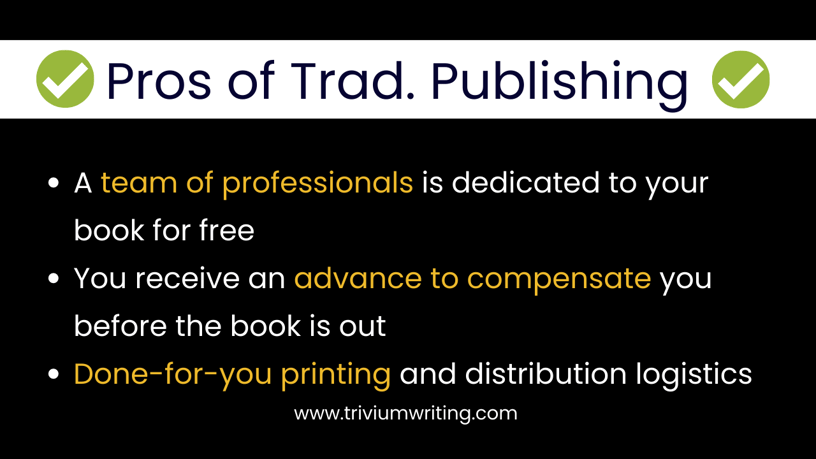
Pro #1: A team of professionals is dedicated to your book for free
The first and most important pro to traditional publishing is the quality of the book you will produce. Traditional publishers provide you with a team of professionals working on your behalf, from editing to marketing. These professionals have worked on all kinds of books and know how to make yours shine.
One of the main fears people have around self-publishing is that the book does not look professional. Authors publishing traditionally don't have to worry about this as their publisher takes care of everything.
Pro #2: You receive an advance to compensate you before the book is out
If you land a traditional book deal, you will likely receive an advance against royalties, which provides some financial security during the writing process. Traditional publishers typically provide such an advance to help you take the time off peacefully. (Note that your agent will take a commission on the advance, generally 15%.)
That said, book advances are not as much as they used to be, and many authors struggle even with those advances. As Derek Murphy writes: "A typical advance is less than $5000, and publishers and agents are increasingly picky. Even if you get published, most authors don’t earn out their advance. Since authors make less than 10% per book sold, even if they publish a book a year (at $5000) it’s a long way away from making a living as an author. Even very successful authors often need a “real” job on the side."
Pro #3: Printing and distribution logistics are done for you
Finally, traditional publishers also handle all of the printing and shipping to bookstores, which means you won't have to worry about any of that. Moreover, most publishers have decades of experience in the industry and know exactly where to go. Unlike self-publishing, with a traditional publisher, you are essentially guaranteed to see your book in bookstores.
Cons of Traditional Publishing
While there are many reasons to choose traditional publishing over other options, there are also some drawbacks you should be aware of before making your decision. Not every author has a fantastic experience working with a traditional publisher.
Here are three cons of traditional publishing:
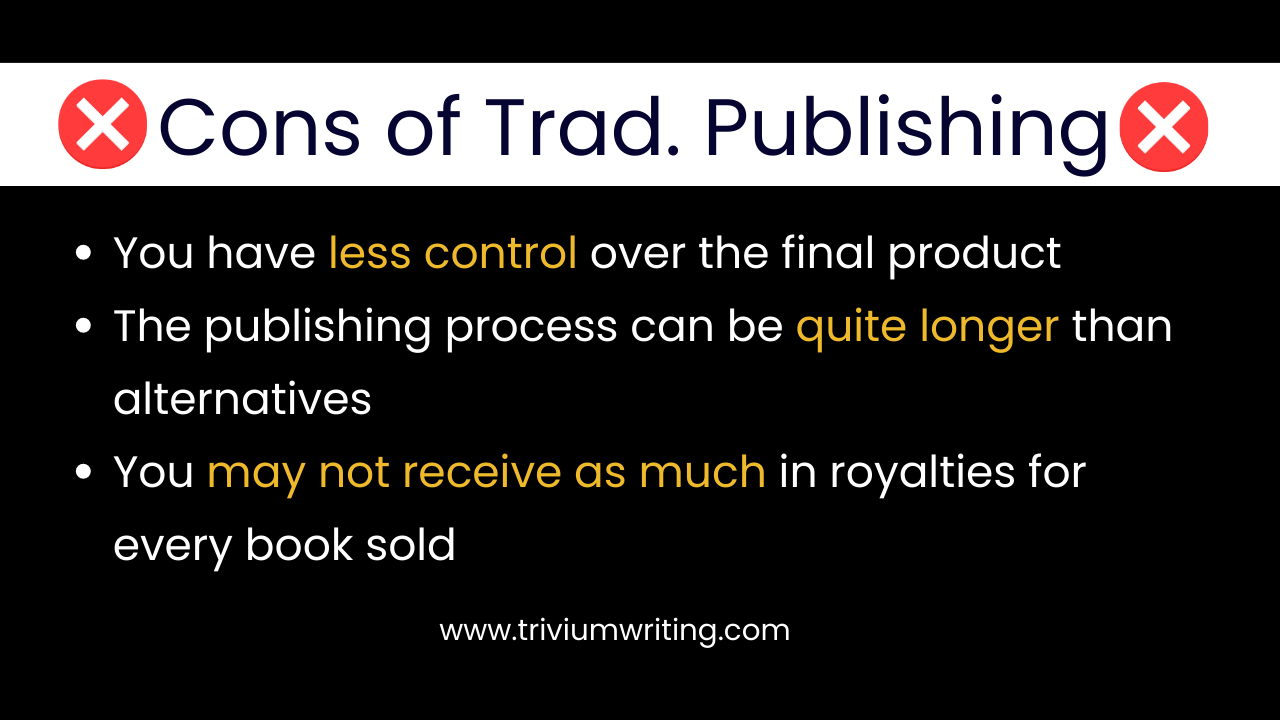
Con #1: You have less control over the final product
Traditional publishers will often want to make changes to your book before it goes to print. As the author, you may not have much say in what those changes are. This can be frustrating if you feel strongly about keeping your original vision for the story intact. Many authors care about preserving creative control, and with a traditional publisher, this can be difficult.
Con #2: The publishing process can be quite lengthy
It sometimes takes years for a traditionally published book to be in bookstores, whereas self-published books can be released much more quickly (assuming all the necessary steps are taken ahead of time). If you're eager to see your work in print sooner rather than later, traditional publishing might not be the best route for you.
Con #3: You may not make as much money per book sold
When you sign with a traditional publisher, they will typically pay an advance upfront which is then recouped through royalties earned on sales. With self-publishing, however, you get to keep most or all of the profits from each sale. So if you're looking to earn as much money as possible per book sold, self-publishing could be a better option for you.
Pros of Self Publishing
The nature of self-publishing is that you cover all the publishing costs and manage the project yourself. This means you either need to learn and practice the skills required to self-publish successfully or hire the professionals who can bring your project to fruition.
Self-publishing is often criticized, but there are many reasons to self-publish.
Here are three reasons:
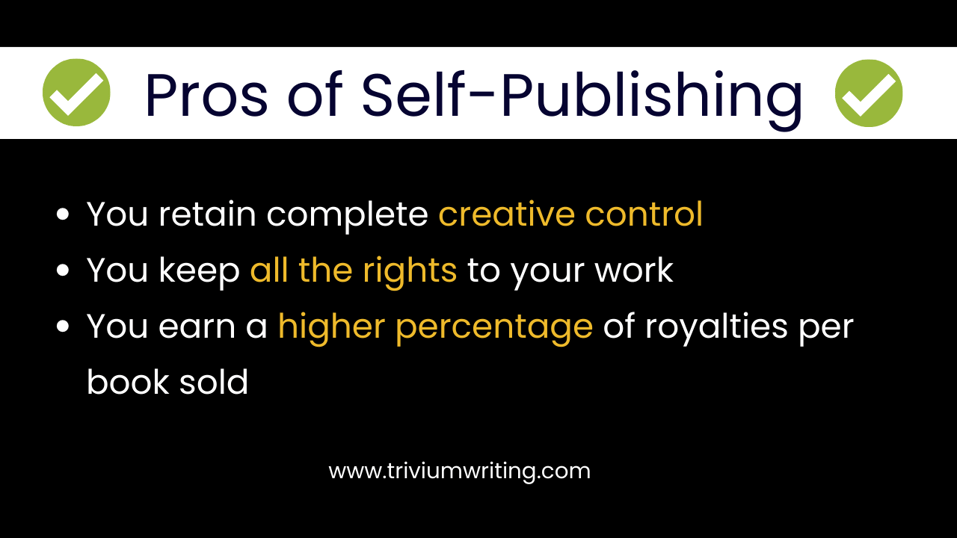
Pro#1: You retain complete creative control
This means you can make all the decisions about your book, from the cover design to content. As a serious author, you'll want to consult industry professionals, but ultimately, you'll have the last word over your book's publishing process. This won't happen with a publishing house!
Pro #2: You keep all the rights to your work
One of the best self-publishing pros is that you retain all rights to your book. When you publish traditionally, you give up some of the rights to your book in exchange for publication. This can lead to complexities later on if you decide to walk away from your publisher.
Pro #3: You earn a higher percentage of royalties per book sold
With traditional publishing, authors typically only receive 10-15% royalty on each book sold. With self-publishing, however, royalty rates are as much as 35% to 70%. Print distribution may be more complex with self-publishing, but the profit margins are higher than with publishing houses.
Cons of Self-Publishing
Before making the decision to go down this route, there are a few disadvantages you should be aware of. Aspiring self-published authors sometimes begin the process with incorrect expectations, so let's make everything clear.
Here are three cons of self-publishing:
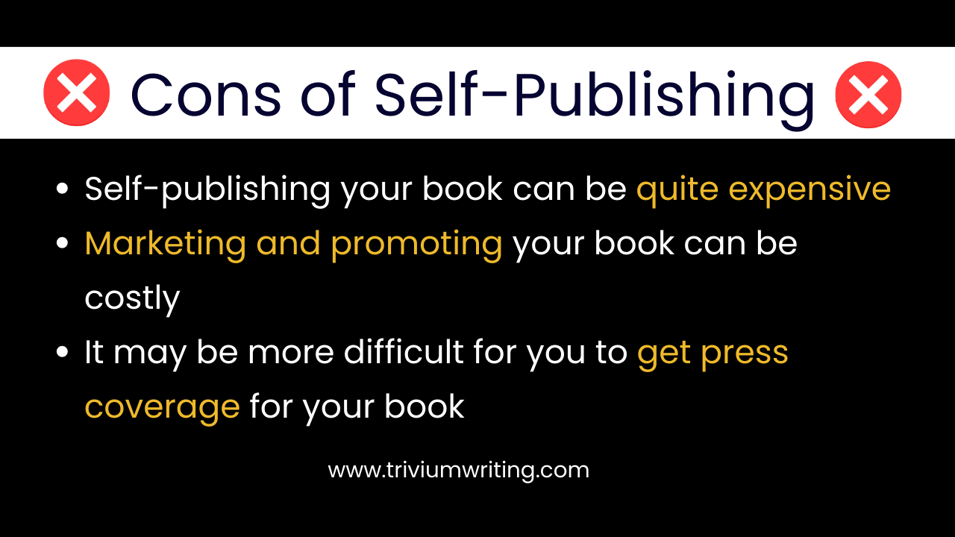
Con #1: It can be quite expensive to self-publish your book
While print-on-demand technology makes book self-publishing economical, self-published authors have to pay for editing, cover design, formatting, and printing costs out of pocket. These services add up and can sometimes be a little more expensive than desired.
Con #2: Marketing and promoting your book can also be costly
While print-on-demand technology makes book self-publishing economical, self-published authors have to pay for editing, cover design, formatting, and printing costs out of pocket. These services add up and can sometimes be a little more expensive than desired.
Con #3: It may be more difficult for you to get press coverage for your book
Because you are not working with a traditional publisher who has established relationships with reviewers and media outlets, it may be more difficult for you to get press coverage for your book. Unless you are able to effectively market your book yourself, it may get lost in the sea of other self-published books on Amazon or other online retailers.
Pros of Hybrid Publishing
The nature of hybrid publishing is that you pay a company to publish your book, but you expect the same process as a traditional publisher. While not as selective as traditional publishers, hybrid publishers offer a similar experience and quality. Hybrid publishing, especially over the past 20 years, has proven a credible alternative to traditional publishing and self-publishing.
Here are three pros of hybrid publishing:
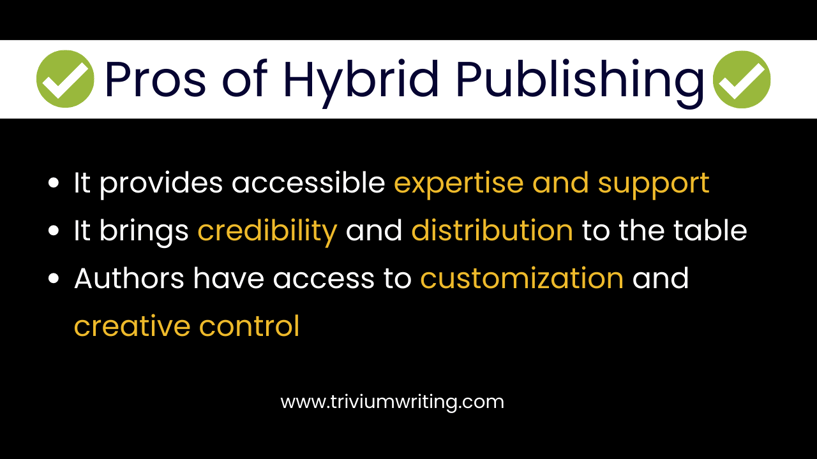
Pro #1: It provides authors with expertise and support—and it's accessible
Hybrid publishing offers a combination of professional support and editorial services, like those provided by traditional publishers, along with the author's own effort, similar to self-publishing. And it is more accessible than traditional publishing—if you have the money.
Pro #2: Hybrid publishers bring credibility and distribution to the table
Hybrid publishing provides authors with a greater level of credibility, legitimacy, and distribution than self-publishing. Moreover, authors have more control over the creative process and financial returns than traditional publishing.
Pro #3: Customization and control are available to authors
Hybrid publishing allows authors to have more customization and control over the publishing process, including design, format, marketing, and distribution. It gives the author the ability to tailor the process to their specific needs and goals, balancing their desire for control with the benefits of professional support.
Cons of Hybrid Publishing
As with any other publishing method, hybrid publishing also has downsides.
Here are three of them:
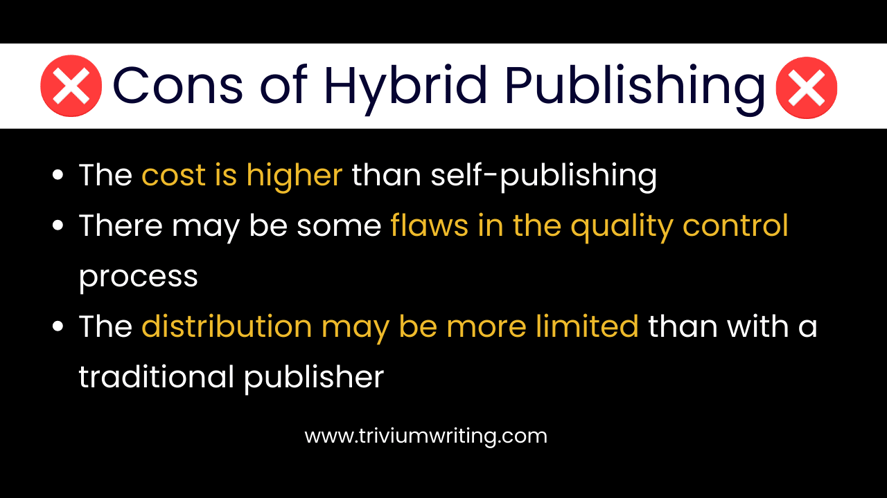
Con #1: The cost is significantly higher than self-publishing
Hybrid publishing is more expensive than self-publishing as authors pay for the professional services offered. It is also more costly than traditional publishing, where the publisher typically covers production costs.
Con #2: There may be flaws in the quality control process
While hybrid publishing offers a level of professional support, authors still run the risk that the final product doesn't meet industry standards. Ultimately, the responsibility for quality control ultimately rests with the author.
Con #3: The distribution may be more limited than with a traditional publisher
Hybrid publishing offers some distribution options, but in most cases, it doesn't reach the same level of influence as traditional publishing. This can limit the exposure and reach of the author's work. Some bookstores don't carry books from hybrid publishers.
Important Reminders About Publishing Approaches
There are many factors to consider when deciding whether traditional publishing or self-publishing is right for you.
Here are a few things to keep in mind:
Reminder #1: Traditional Publishing = Less Work, Less Money
Traditional publishers will provide advances and handle all aspects of the publication process, from editing and design to marketing and distribution. However, they will also take a larger percentage of your book's profits.
Reminder #2: Self-Publishing = More Control, More Investment
Self-publishing gives you more control over the creative process and how your books are marketed and sold, but it requires a greater investment of time and money upfront.
Reminder #3: Someone Has to Pay for Publishing
If it's not you, it's the publisher. Someone has to pay for the publishing process, and whoever pays is the one keeping the majority of the proceeds from the book. This is business. The person who takes the risks also reaps the rewards.
Reminder #4: Remember Your Goals as an Author
Consider your goals as an author. If you're primarily interested in making money from your writing, then traditional publishing may be the better option; if you're focused on creative freedom or building a platform/brand around your work, self-publishing could be a better fit.
Reminder #4: Most Advice Comes from People With Ulterior Motives
You may be looking for clarity about how to publish your book, and you've probably heard other advice. Remember that most people try to sell you something—whether it be a product, service, or simply the idea that their way is the best way. Take everything with a grain of salt.
At Trivium Writing, our goal is to provide quality information to aspiring authors. While we do sell services, we don't push one particular publishing approach. We care about good books and good writing. How these books are published, to us, is secondary.
Reminder #5: Publishing Approaches Aren't Mutually Exclusive
At Trivium Writing, we encourage some clients to try to get a traditional publishing deal. After all, there is no harm in trying because if you get rejected, you can then move forward with hybrid or self-publishing. Yes, it will delay your publication by several months, but at least you'll have tried.
We also regularly work with clients who want to use a hybrid publisher that doesn't offer coaching, consulting, and/or editing services. One of our recent clients, Hendrix Black, author of The 7 Initiatory Fires of Modern Manhood, came to us even though he worked with Morgan James Publishing.
Conclusion: Which Publishing Approach is Right for You?
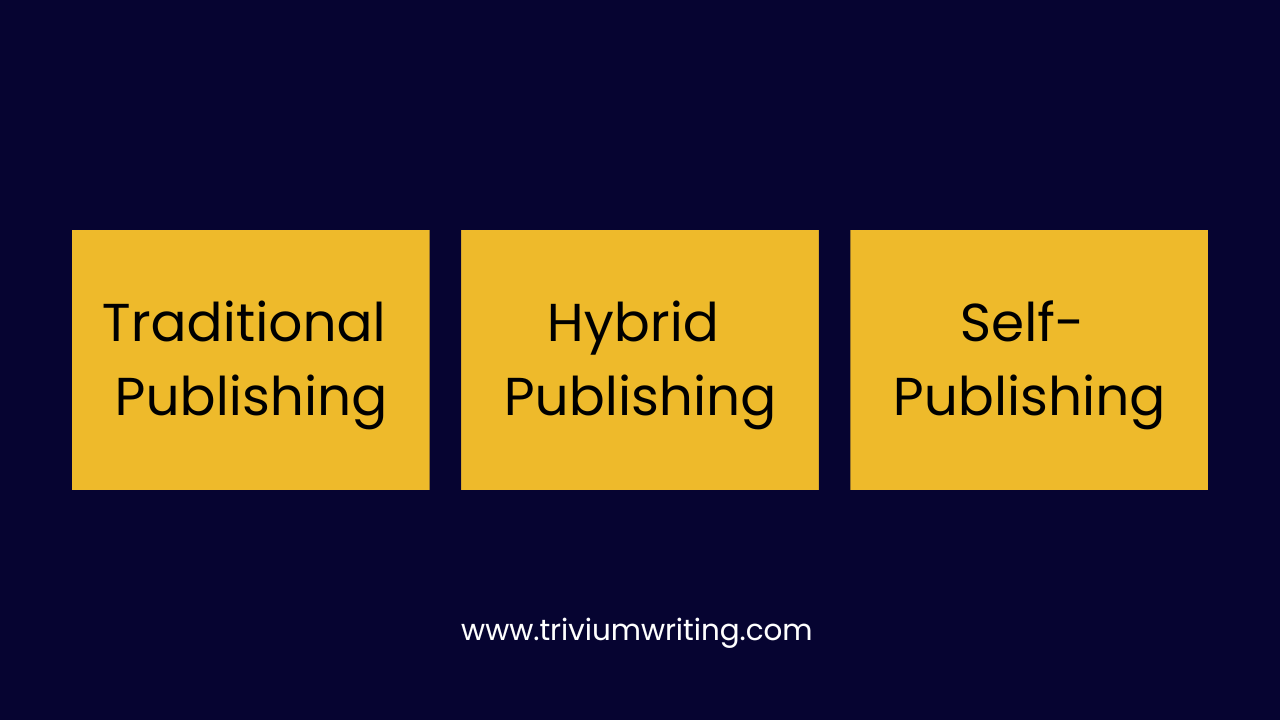
There's no one-size-fits-all answer to the question of whether traditional publishing, self-publishing, or hybrid publishing is the right choice for you. It depends on your goals, your budget, your timeline, and your willingness to do the work required to achieve your desired outcome.
If you're looking to publish a book quickly and cheaply, self-publishing is probably the way to go. If you're looking to publish a book with the help of a professional team and you're willing to wait a bit longer and give up some creative control, traditional publishing may be the right choice for you. Finally, if you're looking to pay the cost of publishing and get most of the same benefits as traditional publishing, then hybrid publishing may be for you.
The decision of how to publish is an important one, and you shouldn't take the process lightly. We hope this blog post has given you the information you need to make an informed decision. If you still feel confused about which publishing method is right for you, book a free call to receive an expert's opinion.
-png.png)

